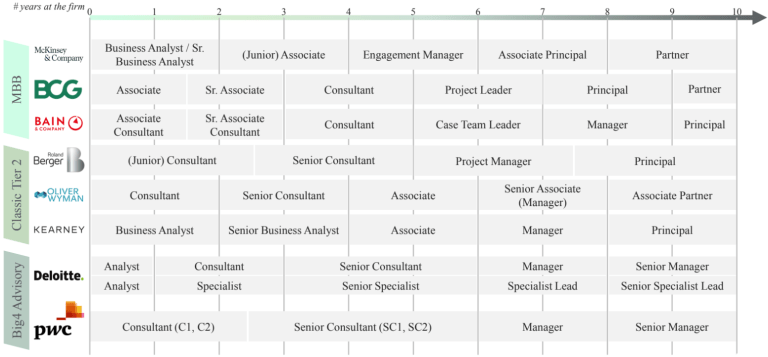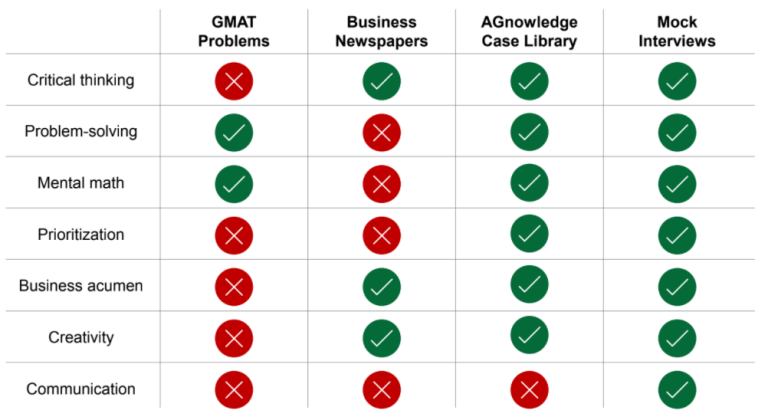I have been asked multiple times during the application seasons about how to write a proper resume. More specifically how to write a management consultant resume for McKinsey, BCG or Bain. A CV should be a summary of where you have been, but must show the way you are going, and your capacities to reach that destination. All CVs should be concise and easy-to-read, since recruiters spend somewhere between 30-60 seconds reviewing it. As a McKinsey recruiter once said:
“I do not want to waste my time on CVs. If I do not see these points in less than 30 seconds, that candidate is rejected
But what are the points he was talking about?
Experience
McKinsey, Bain, BCG, and generally all management consultant firms are looking for relevant, valuable experience. They want to see that you have solid foundations and work ethic, so you can be deployed on projects from Day 1. What is the best experience before MBB?
- The most valuable source of experience is consulting itself. It shows that you are stress resilient, have analytical capacities and can deliver high quality work under constant pressure. Before I applied for my first internship, I helped a family company as a “Marketing Consultant”. I spent two years at Deloitte before I applied for a BCG position.
- The second best experience you can have is project management. It shows your coordination capabilities and leadership skills (more in the next point), both important for a consultant. If you are applying for entry-level jobs, you should also list any board or leadership experience for student organizations.
- The third best option is any field related to the company. For example, IBM advisory will appreciate technology-related experience, McKinsey New York or London will love your finance background, while experience in manufacturing will be a plus for BCG Munich
Leadership skills
Leading projects is a natural part of the consultant career path. Since all top consultant firms have up-or-out policy in place, you will find yourself in the role of a project manager in 5-6 years, but will coordinate juniors after 2-3 years. You must demonstrate that you are able to coordinate, lead as well as support people. If you are assigned to 6-digit projects, you should be able to keep your subordinates on track. Do not devote a separate section for leadership, rather include it in the experience description.
Outstanding academic performance
Academic performance is the best indicator if you can overcome intellectual challenges. Although there are no specific field of study that you need to follow, I would advise Business & Management, (Corporate) Finance or some technology-related field, in this order. Keep in mind university ranking too. The better your university, the higher your chances. MBB requires you to be in the top 3% of the class of a leading university. Unfortunately, high grades are non-negotiable if you want to go to these companies straight from uni. Extracurricular activities, such as student organizations, participating and winning case study competitions, or being a teaching assistant will also improve your chances.
International exposure
The employee base of consultant firms is diverse in terms of background and nationality. Being staffed on international cases most of the time does require the ability to manoeuvre between cultures and overcome the challenges imposed by the multinational environment. Exchange semesters, international summits and working in multicultural teams will all show your international exposure.

How to write a CV? What to include in a resume?
Applicant personal information
Include personal data on the top of your resume, including name, contact details (mobile + professional email), location (city). A link to your LinkedIn profile will also help you track the progress of your application, as you will most likely receive a notification if the interviewer checks your profile. This is a good way to familiarize yourself with the person who will sit at the other end of the table during the interview
Experience
List all of your experience, including company name, country (or state). Use bullet points to show your achievements. On the other hand, always try to quantify your results, if it’s possible. Some examples are below:
- Regular statement: Worked on the small company’s social media and published articles
- MBB-proof statement: Was in charge of a startup’s social presence. I managed a content of over 50 articles, which resulted in 52% higher engagement and a 24% higher customer base
- Regular statement: Studied financial performance of companies and made recommendation
- MBB-proof statement: Monitored 5 Forbes 500 companies’ portfolio and enhanced their performance by 13% ($3.1M) over a year by refining cost of capital calculations for information-poor markets and re-weighting portfolio based on resulting valuations
- Regular statement: Organised catering events for the student association
- MBB-proof statement: Coordinated the work of 10 other students to deliver 3 high-end events, which supported the recruitment activities of the student association
Education
List the institution you attended. If you are an experienced applicant, list only the last two schools (MBA + Masters). Otherwise, you can list your Masters and Undergraduate universities. I suggest not to mention your high school, or junior colleague, except if they are leading institutions and you do not have a master degree. Do not forget to state the name of the institution, program you enrolled, GPA (if you are in the top 10%) and degree (e.g. honors) you received. If the language of your education differs from your mother tongue, feel free to highlight. If you are a fresh graduate and do not have too much experience, you can also list the topic of your thesis work.
Extracurricular, awards and volunteering
Management Consulting firms are looking for a wide range of extracurricular activities. They want to see that you are ready to, and able to go an extra mile. This can be anything from student organizations, board activities, academic or sport competitions. Volunteering also looks good on a resume. It shows that you also care about others, alluding that your future colleagues can count on you.
Other skills:
Briefly list the languages you speak with the level of efficiency. You can add software skills (e.g Microsoft Office, or Excel, PowerPoint). You can also add niche knowledge (e.g. JIRA, Confluence, Microsoft Projects for a project management role). Consultants travel a lot, so the company may require a driving license. It is worth highlighting that too.
Some DOs and DON’Ts:
- Follow chronological order: Most recent activities are listed first in each of the above sections
- Use consistent formatting (mm/yyyy)
- Put everything in past tense
- Maintain readable font; 11+ Times New Roman is preferred
- Use bullets and concise sentences. No periods at the end of bullets
- Avoid jargon, acronyms and repetition of words
- Read it through so you avoid spelling mistakes
- Do not include photo, except if it explicitly mentioned
- Do not include your age
- If you have less than 5 years of experience, stick to 1 page
- No summary or personal motivation
- Align everything (invisible tables are helpful for this -> see attached template below)
- Respect the margin, so interviewers can print and write on your CV (2.5cm / 1 inch)
- Save as a PDF, with the following name convention: First name_Family name_Resume
Want to get one-on-one coaching with us?
Click here to visit our view our services!
This article is part of a series of introductory articles:





